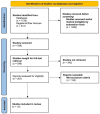Beyond physical health: the role of psychosocial challenges and stigma in tackling the COVID-19 pandemic-A scoping review
- PMID: 37496686
- PMCID: PMC10366364
- DOI: 10.3389/fpsyt.2023.1180252
Beyond physical health: the role of psychosocial challenges and stigma in tackling the COVID-19 pandemic-A scoping review
Abstract
Background: The socio-cultural response to the Coronavirus Disease 2019 (COVID-19) and the level of adherence to evidence-based guidelines played a crucial role in determining the morbidity and mortality outcomes during the pandemic. This review aims to evaluate the impact of stigma and psycho-socio-cultural challenges on efforts to control the COVID-19 pandemic and to identify ways to mitigate such challenges in future pandemics.
Methods: Using keywords including COVID-19, coronavirus, stigma, psychosocial challenges, and others, the authors searched seven major databases with a time limitation of July 2021, which yielded 2,038 results. Out of these, 15 papers were included in this review.
Results: The findings of the review indicated that several psychosocial, socio-economic, and ethno-cultural factors are linked to the transmission and control of COVID-19. The research revealed that stigma and related psychosocial challenges and others, such as anxiety, fear, and stigma-driven social isolation, have resulted in significant mental health problems.
Discussion: The review underscores the negative impact of stigma on COVID-19 patients, survivors, and the general population. Addressing stigma and psychosocial challenges is crucial to effectively manage the current pandemic and to prevent similar challenges during future public health crises.
Keywords: COVID-19; conspiracy; infodemic; mental health; pandemic; psychocultural; psychosocial; stigma.
Copyright © 2023 Jain, Bhivandkar, Baqir, Shoib, Nimavat, Mohan, Zubair, Jawad, Muhammed, Ahmed, Sachdeva and Ahmed.
Conflict of interest statement
The authors declare that the research was conducted in the absence of any commercial or financial relationships that could be construed as a potential conflict of interest.
Similar articles
-
Social Distance in COVID-19: Drawing the line between protective behavior and stigma manifestation.Psychiatriki. 2021 Sep 20;32(3):183-186. doi: 10.22365/jpsych.2021.025. Epub 2021 Aug 5. Psychiatriki. 2021. PMID: 34390552 English, Greek, Modern.
-
Psychosocial impact of COVID-19.Diabetes Metab Syndr. 2020 Sep-Oct;14(5):779-788. doi: 10.1016/j.dsx.2020.05.035. Epub 2020 May 27. Diabetes Metab Syndr. 2020. PMID: 32526627 Free PMC article. Review.
-
The Resilience Hub approach for addressing mental health of health and social care workers during the COVID-19 pandemic: a mixed-methods evaluation.Health Soc Care Deliv Res. 2024 Sep;12(29):1-164. doi: 10.3310/HGQR5133. Health Soc Care Deliv Res. 2024. PMID: 39264827
-
Psychological health during the coronavirus disease 2019 pandemic outbreak.Int J Soc Psychiatry. 2020 Aug;66(5):512-516. doi: 10.1177/0020764020925835. Epub 2020 May 21. Int J Soc Psychiatry. 2020. PMID: 32434402 Free PMC article. Review.
-
Internalized stigma related to COVID-19 and its psychosocial and mental health correlates: a multicentric health facility based observational study from Nepal.Front Psychiatry. 2024 Feb 14;14:1276369. doi: 10.3389/fpsyt.2023.1276369. eCollection 2023. Front Psychiatry. 2024. PMID: 38419690 Free PMC article.
Cited by
-
Insights from China: understanding the impact of community resilience and government trust in psychological resilience and anxiety during COVID-19.Front Public Health. 2023 Nov 28;11:1298269. doi: 10.3389/fpubh.2023.1298269. eCollection 2023. Front Public Health. 2023. PMID: 38089038 Free PMC article.
-
The Impact of the COVID-19 Pandemic on the Incidence of Herpes Zoster: A Narrative Literature Review.Infect Dis Ther. 2024 Mar;13(3):447-461. doi: 10.1007/s40121-024-00924-3. Epub 2024 Mar 5. Infect Dis Ther. 2024. PMID: 38441844 Free PMC article. Review.
References
-
- Jamieson K, Albarracín D. The relation between media consumption and misinformation at the outset of the SARS-CoV-2 pandemic in the US. Harv Kennedy Sch Misinformation Rev. (2020) 1:1–22. 10.37016/MR-2020-012 - DOI
Publication types
LinkOut - more resources
Full Text Sources


